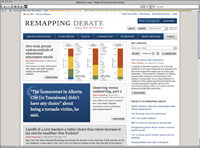“For a long, long time, I thought that political reporting on public policy issues had been very constrained,” says founding editor Craig Gurian. “It seemed to us that a good portion of that has to do with the fact that, if reporters have embedded assumptions about what’s possible, feasible, and desirable, those assumptions are going to limit and restrict the questions that they are going to be asking.”
Those assumptions, Gurian continued, range from the idea that “economic growth” is invariably a positive to the idea that there are no clear solutions to the problem of dwindling natural resources. Gurian says that Remapping Debate aims its coverage at a broad audience that includes journalists, editors, policy makers, policy advocates, and those that simply want to be more informed citizens.
The website is crisp and text heavy, with easy-to-navigate tabs that link to sections ranging from original reporting to commentary. Along with comprehensive articles, video interviews, and even photo essays, there’s also a section dedicated to maps, graphs, and tabulated data that provide visual representation of trends, demographics, and underreported statistics. One popular section, dubbed “Story Repair,” questions, dissects, and adds to media reports which, according to the site’s staff, failed to fully investigate the given subject. On the flipside, the website highlights deserving reports with a “Kudos” section that provides summaries, analysis, and a pat on the back to stories from other outlets.
Gurian (who also contributes articles to the site) and associate editor Lori Bikson oversee a full-time reporting staff that includes Mike Alberti, James Lardner, and Eric Kroh. Freelancers are used infrequently. Gurian is working to expand the reporting staff; pushovers need not apply.
“We don’t think it’s really a good idea to go out there with one’s mind empty,” Gurian says. “We think it is a good idea to go out there with a very healthy sense of curiosity. We also think it’s important to go out there, not looking at a story as a form where there are just little pieces to fill in with whatever the spokesperson says or making invisible those who find it convenient not to cooperate.”
When a source fails to reply to direct questions with to-the-point answers, Gurian says Remapping Debate will cite that failure rather than simply quoting vague, off-topic responses. A clear example of this can be found in one of Gurian’s own pieces, “Disappearing patient choice courtesy of private health insurer?” In it, he takes a hard look at Oxford Health Plans, a United Healthcare company. After describing the proposed question, he writes: “Oxford’s email reply, from company representative Maria Gordon-Shydlo, was not responsive and a follow-up request was not responded to.”
In these cases, he argues, it is fair to state the interviewee was unresponsive to the question.
“In the same way you assess what flames coming out of a building mean–it’s a fire–when it’s unresponsive, its unresponsive. We think it’s irresponsible to just put the answer out there and say ‘okay, our job is done.’ It is a disservice to the reader to act simply as a stenographer.” To that end, the site isn’t afraid to call out fellow journalists for allegedly publishing puppet-like stenography in the place of potentially hard-hitting, investigative pieces. So far, he says Remapping Debate hasn’t really had direct feedback from writers whose stories have been repaired or criticized, but other journalists have commended the effort.
Gurian, a practicing lawyer who earned three degrees at Columbia University, is an adjunct professor of law at Fordham Law School and executive director of Remapping Debate’s parent not-for-profit organization, the NYC-based Anti-Discrimination Center. Remapping Debate is supported by a portion of “several million dollars” in winnings in a legal settlement over Westchester County’s failure to meet affirmatively furthering fair housing (AFFH) obligations. This is how Remapping Debate continues to run, eight months since its launch, without plastering pages with ads, donate buttons or foundation names. Gurian, who says the sight can be maintained for “several years” without any further revenues, says his goal has been to develop a substantial body of work before seeking out other funding resources. That said, the door is always open to interested financial contributors.
Overall, Gurian, while admitting he sets the standards high, said it’s not an easy project–but it is an exciting one.
“I think we made a really good beginning. I am as excited about it now as I was when we launched and I am looking forward to doing even better. We want to make sure that, when a reader sees a headline from Remapping Debate, they know they actually have to read the article all the way to the end before they know what happens.”
 NEW YORK, NEW YORK — Armed with flexible hypotheses rather than fill-in-the-blank assumptions, the public policy focused e-journal Remapping Debate aims to cut through the all-too-common political smokescreen to expose the true motivations behind–and the aftereffects of–top-level decision making, political or otherwise. Be it digging into the true cost of social security or taking a well-rounded look at proposed healthcare reform, Remapping Debate, launched in October 2010, asks and answers both “why” and “why not” questions in meaty, unflinching articles.
NEW YORK, NEW YORK — Armed with flexible hypotheses rather than fill-in-the-blank assumptions, the public policy focused e-journal Remapping Debate aims to cut through the all-too-common political smokescreen to expose the true motivations behind–and the aftereffects of–top-level decision making, political or otherwise. Be it digging into the true cost of social security or taking a well-rounded look at proposed healthcare reform, Remapping Debate, launched in October 2010, asks and answers both “why” and “why not” questions in meaty, unflinching articles.
